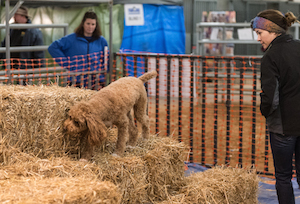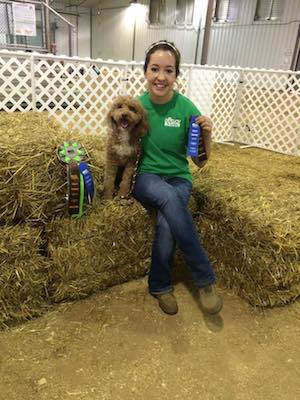 Barn Hunt is the new and quickly growing dog sport that is gaining popularity across America. I’ve been competing in Barn Hunt with Harley over the past four months. In this timed event, dogs locate rats (safely enclosed in aerated tubes) hidden in a straw/hay bale maze. Barn Hunt is committed to creating a safe and fun sport for dogs, that also holds rat care at the highest level of consideration. This sport is based on the traditional roles of many dog breeds in riding farms, barns, crop storage areas, etc. Barn Hunt allows breeders to test proper working traits in their dogs in a real-life setting.
Barn Hunt is the new and quickly growing dog sport that is gaining popularity across America. I’ve been competing in Barn Hunt with Harley over the past four months. In this timed event, dogs locate rats (safely enclosed in aerated tubes) hidden in a straw/hay bale maze. Barn Hunt is committed to creating a safe and fun sport for dogs, that also holds rat care at the highest level of consideration. This sport is based on the traditional roles of many dog breeds in riding farms, barns, crop storage areas, etc. Barn Hunt allows breeders to test proper working traits in their dogs in a real-life setting.
Barn Hunt is for anyone interested in a new way to interact with their dog that provides their dog with a new challenge. All breeds and ages of dogs (including tripod and deaf dogs) can do this sport—as can all ages of people. If your dog can fit through an 18 inch wide by bale-height-tall tunnel then they are good to go. Progress is charted through titles, levels of increasing difficulty, and championships. Barn Hunt is an independent sport, but titles are recognized by both the American Kennel Club (AKC) and United Kennel Club (UKC).
 After competing in both agility and obedience with Harley, I wanted to try something a little different. Barn Hunt, like other canine nose work sports, relies on your dog and their incredible sense of smell. In this scenario, the dog is the team captain calling most of the shots while you as the handler trust your dog and occasionally help them puzzle out where the source (the rat) is located. It really helps build a dog’s confidence and focus their energy.
After competing in both agility and obedience with Harley, I wanted to try something a little different. Barn Hunt, like other canine nose work sports, relies on your dog and their incredible sense of smell. In this scenario, the dog is the team captain calling most of the shots while you as the handler trust your dog and occasionally help them puzzle out where the source (the rat) is located. It really helps build a dog’s confidence and focus their energy.
There is a fun test coming up here in Bryan, Sunday April 10 where you and your dog could try Barn Hunt for yourself! You can find out more details here. Come out. I think both you and your dog with enjoy it!
To find out more, visit barnhunt.com to understand the rules and look at upcoming events.
